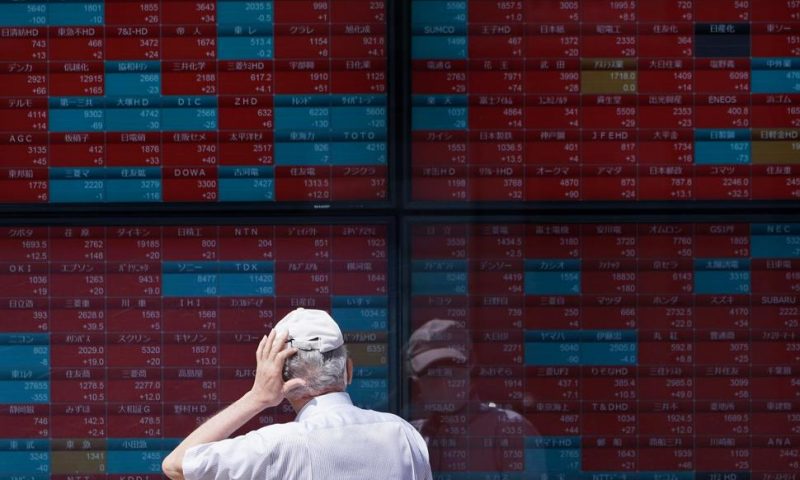Shares are mostly lower in Asia after Wall Street pumped the brakes on its recent rally, breaking a seven-day winning streak for the S&P 500.
Shares were mostly lower in Asia on Wednesday after Wall Street pumped the brakes on its recent rally.
Tokyo’s Nikkei 225 index edged higher, while the Shanghai Composite sank 1.6%.
Overnight, a late slide in big technology companies left indexes broadly lower, breaking a seven-day winning streak for the S&P 500.
A discouraging lack of progress on talks over more economic aid for the U.S. economy, coupled with worries over the coronavirus pandemic and tensions between the U.S. and China, have prompted investors to sell and lock in profits from recent gains, analysts said.
“When you walk back the market’s expectations of an imminent fiscal deal, it is like poking the balloon with a straight pin as all semblance of near-term optimism gets immediately deflated,” Stephen Innes of AxiCorp. said in a commentary.
The Nikkei 225 gained 0.3% to 22,821.28, while Hong Kong’s Hang Seng edged 0.2% lower to 24,841.00. In South Korea, the Kospi slipped 0.1%, to 2,417.12. The Shanghai Composite index lost 53 points to 3,287.13. Australia’s S&P/ASX 200 declined 0.5% to 6,110.70.
Shares fell in Taiwan, India and most of Southeast Asia.
Overnight’s reversal left the S&P 500 with a 0.8% loss, at 3,333.69. Drops for big-name technology stocks like Apple and Microsoft, plus losses in health care and communications stocks, outweighed gains in financial, industrial and energy companies.
Tech stocks have far outpaced the rest of the market this year as investors bet they could still thrive in a stay-at-home economy.
The pullback ended the S&P 500’s seven-day winning streak. Despite the sell-off, the benchmark index remains within 2% of the all-time high it reached in February, reflecting a stunning turnaround from a nearly 34% tumble in March when the coronavirus pandemic sent stocks into a nosedive.
Investors have grown more confident in recent weeks amid some positive economic data and better-than-expected second-quarter results from companies, suggesting corporate profits could be headed higher in the second half of this year and in 2021.
Unprecedented actions by the Federal Reserve to stabilize markets this spring, including cutting interest rates and ramping up bond purchases, have made stocks attractive relative to other assets and given traders enough confidence to keep snapping up stocks.
Traders are also increasingly optimistic that the many pharmaceutical companies working on ways to treat COVID-19 will deliver a working vaccine in the coming months.
The Dow Jones Industrial Average dropped 0.4% to 27,686.91. The Nasdaq composite lost 1.7% to 10,782.82. The Russell 2000 index of small company stocks gave up 0.6%, to 1,575.10.
While talks between Democrats and Republicans on a new economic relief package appear to have stalled, investors are still optimistic both sides will reach an agreement.
The yield on the 10-year Treasury rose to 0.65% from 0.57% late Monday, a big move.
The price of gold fell further after breaching $2,000 per ounce earlier last week, giving up $56.20 to $1,890.10.
Benchmark U.S. crude oil for September delivery gained 14 cents to $41.75 per barrel in electronic trading on the New York Mercantile Exchange. It fell 0.8% to settle at $41.61 per barrel on Tuesday. Brent crude oil for October delivery picked up 20 cents to $44.70 per barrel. Overnight, it lost 1.1% to settle at $44.50 per barrel.
In currency dealings, the U.S. dollar bought 106.73 Japanese yen, up from 106.51 yen late Tuesday. The euro weakened to $1.1723 from $1.1744.

